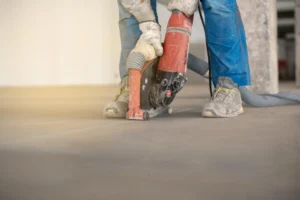Quartz vs Granite vs Marble are three of the most sought-after materials for countertops, each offering its unique charm and functionality. Whether you prefer the engineered brilliance of quartz, the natural beauty of granite, or the timeless elegance of marble, your choice can significantly impact the aesthetics and performance of your space. Understanding the characteristics and advantages of these materials is crucial before making such an investment.
Selecting the right countertop isn’t just about looks, it’s about blending practicality, budget, and personal style. This article dives deep into the comparison of Quartz, Granite, and Marble to help you decide which material aligns perfectly with your needs. Let’s explore their unique features, pros and cons, and prices, so you can make an informed and confident decision.
Granite Countertops: Characteristics

Natural Origin of Granite
Granite is a natural stone formed through the slow cooling of molten lava beneath the Earth’s crust. This process results in its signature durability and striking appearance. As one of the hardest stones, granite has been a popular choice for countertops due to its unmatched blend of beauty and resilience.
Durability and Stain Resistance
Known for its exceptional durability, granite countertops are resistant to scratches, making them ideal for high-traffic kitchens. With proper sealing, they also offer strong stain resistance, safeguarding their surface from spills of coffee, wine, or other liquids. This makes them a practical and long-lasting solution for busy households.
Unique Colors and Patterns
Every granite slab is unique, boasting a one-of-a-kind pattern and color variation. From speckled to veined designs, granite comes in a wide array of shades, including blacks, whites, grays, and even blues. These diverse colors and patterns make it easy to find a granite countertop that complements your interior design theme perfectly.
Common Applications in Homes
Granite countertops are a popular choice in both kitchens and bathrooms. Their heat-resistant properties make them perfect for areas near stoves or sinks, while their natural elegance enhances any space. Granite’s ability to withstand wear and tear ensures it remains a timeless addition to modern and traditional interiors alike.
Quartz Countertops: Characteristics

What Are Quartz Countertops and How Are They Made?
Unlike natural stones, quartz countertops are engineered from a blend of crushed quartz, resin, and pigments. This manufacturing process creates a stone countertop that combines the beauty of natural materials with enhanced durability and versatility. The controlled production ensures consistency in design, making quartz an excellent alternative to natural stones.
Key Features of Quartz Countertops
One of the standout characteristics of quartz is its non-porous surface, which resists moisture, stains, and bacteria. Additionally, its scratch resistance makes it a durable option for high-traffic areas like kitchens. Available in a variety of colors, from bold hues to subtle neutrals, quartz allows homeowners to achieve the desired aesthetic without compromising functionality.
Perfect Choice for Modern Homes
Quartz has become a go-to material for kitchens and bathrooms in modern homes. Its durability, low-maintenance surface, and sleek appearance make it ideal for creating contemporary and elegant spaces. Whether you’re considering Quartz vs Granite vs Marble, quartz stands out for its practicality and ease of upkeep, especially in busy households.
Marble Countertops: Characteristics

Elegance and Natural Veining
A marble countertop is synonymous with luxury and timeless beauty. Sourced from natural quarries, marble is celebrated for its intricate veining patterns and soft, elegant appearance. Unlike engineered marble, which mimics the look of the real stone, true marble offers a one-of-a-kind aesthetic that has captivated interior designers for centuries.
Key Features of Marble Countertops
Marble’s soft texture gives it a distinct feel, making it stand out among other countertop options. However, this softness also means it’s more prone to scratches and wear and tear compared to harder materials like granite or quartz. While not as highly durable, with proper care and regular sealing, marble can resist minor stains and last for decades. Its susceptibility to staining, though, requires attentiveness, especially in kitchens where spills are common.
A High-End Appeal for Modern Spaces
Favored by homeowners and interior designers alike, marble brings a sense of refinement to any space. It’s a popular choice for creating statement surfaces in luxury kitchens and bathrooms, elevating both classic and contemporary designs. When comparing Quartz vs Granite vs Marble, marble is often chosen for its unmatched sophistication and unique character, making it a staple in high-end home design.
Quartz vs Granite vs Marble Countertops: Pros and Cons
Material | Pros | Cons |
Granite | Offers a natural and unique look with a broad range of colors. | Requires regular sealing to maintain its resistance to stains properties. |
Highly durable and resistant to scratching. | Patterns and colors vary, making matching slabs challenging. | |
Excellent heat resistance, ideal for a kitchen or bathroom. | Higher maintenance compared to quartz. | |
Quartz | Provides a consistent appearance, with a vast range of color options to suit any style. | Less heat-resistant than natural stone like granite. |
Non-porous surface, highly resistant to stains, and requires minimal maintenance. | Typically pricier than some granite options. | |
Engineered material ensures uniform patterns. | May not offer the natural feel of granite or marble. | |
Marble | Renowned for its elegant and timeless look with natural veining that adds luxury appeal. | Soft surface that can easily scratch; less resistant to scratching. |
Enhances property value due to its upscale aesthetic. | High maintenance, with susceptibility to etching and staining without sealing. | |
Preferred by designers for statement pieces in luxury kitchen or bathroom spaces. | Limited resistance to stains performance compared to quartz and granite. |
When deciding between Quartz vs Granite vs Marble, consider the balance of beauty, practicality, and budget that best fits your space. Each material has its unique strengths and weaknesses, making it essential to align your choice with your specific needs. Whether prioritizing elegance, durability, or ease of maintenance, there’s a perfect countertop option for every home.
Marble vs Granite vs Quartz Price
Overview of Pricing
When choosing between Quartz vs Granite vs Marble, understanding the cost differences is essential. Prices for these materials vary based on factors like quality, availability, and design complexity. Beyond the material itself, installation costs can significantly influence the overall price.
Factors Affecting the Cost
- Material Quality: Premium-grade slabs or intricate patterns in marble and granite command higher prices. Quartz, being engineered, has more consistent pricing but can increase for high-end brands.
- Availability: Locally available stones tend to cost less than exotic imports. Rare granite or marble types may carry a hefty price tag.
- Design Preferences: Custom edge finishes, cut-outs, or large slab requirements impact costs regardless of the material.
Comparative Price Table
Material | Cost per Square Foot (Including Installation) |
Marble | $50 – $200+ |
Granite | $40 – $100+ |
Quartz | $60 – $150+ |
Making the Right Choice
Deciding between Quartz vs Granite vs Marble requires balancing aesthetics with your budget. Marble tends to be the most expensive due to its luxury appeal and rarity, while granite offers a range of options for various price points. Quartz often falls in the mid to high range due to its engineered versatility and low maintenance. Evaluate your needs and preferences to determine which material aligns best with your home and budget.
Quartz, Granite, or Marble: Which Should You Choose?
Key Decision-Making Factors
Choosing between Quartz vs Granite vs Marble depends on several factors that align with your lifestyle and home design. Start with your budget; marble, being a luxury material, often comes at a higher price, while granite and quartz offer more flexible options. Next, consider style preferences: marble exudes timeless elegance, granite offers unique natural patterns, and quartz provides consistency with a wide range of modern colors. Also, think about maintenance requirements: quartz requires minimal upkeep, granite needs periodic sealing, and marble demands extra care due to its softness and staining tendencies.
Best Material for Kitchens, Bathrooms, and More
The purpose of the countertop greatly influences the ideal choice. For high-traffic areas like kitchens, durability is crucial granite and quartz are excellent options due to their scratch resistance and durability. In bathrooms, where elegance is often prioritized, marble adds a luxurious touch. For accent areas such as fireplace surrounds or tabletops, all three materials can shine, but the choice depends on whether you prefer marble’s opulence, granite’s natural uniqueness, or quartz’s low-maintenance appeal.
Final Advice on Choosing the Perfect Countertop
When comparing Quartz vs Granite vs Marble, the best material is the one that aligns with your specific needs. For homeowners seeking durability and ease of maintenance, quartz may be the ideal choice. If you’re drawn to the unmatched beauty of natural stone and are willing to invest time in upkeep, granite and marble are excellent contenders. Ultimately, consider your lifestyle, budget, and the function of the space to select a countertop that combines beauty and practicality.
Final Thoughts
In this comparison of Quartz vs Granite vs Marble, we’ve explored the unique characteristics, benefits, and drawbacks of each material. Granite offers natural beauty and durability, while quartz provides a low-maintenance, consistent option for modern spaces. Marble, with its timeless elegance, remains a sought-after choice for luxury designs, though it requires more maintenance. Ultimately, your decision should be guided by your budget, style preferences, and how much upkeep you’re willing to invest in.
At Stone Sealer Restoration, we understand that selecting the perfect countertop material is a significant decision. We encourage you to take your time considering your personal needs and design aspirations. Whether you’re remodeling a kitchen or bathroom, it’s always wise to consult with experts or visit a showroom to explore all your options before making a final choice. Let us help you make the best decision for your home!






